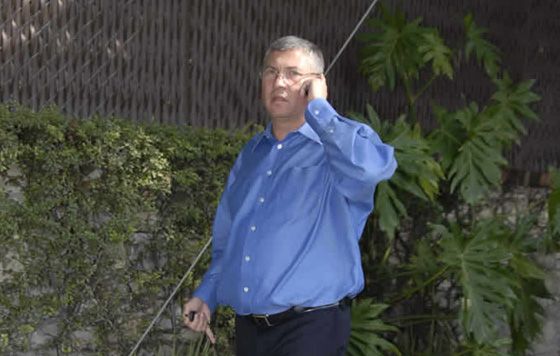
An IRS Regulation Offers a New Weapon Against Mexican Drug Cartels
Fernando Cano was a discreet man in every way. The 55-year-old Mexican construction tycoon wore simple dark suits, which covered his bulging belly. He drove a black Chevy Suburban, like many other residents of his hometown Ciudad Victoria, the small capital of Tamaulipas. He rarely showed emotion in public but was known for being polite. He greeted all who approached him at the local shopping mall. In most ways, Cano was a typical empresario from the border. But his ordinary appearance belied a terrible occupation: He was a money launderer for Los Zetas, Mexico’s most feared drug cartel, according to a recent federal indictment.
In May, Cano was indicted in federal court in Brownsville on money-laundering charges. He is accused of laundering $40 million in drug money and cartel bribes to Tamaulipas officials since 1998. Cano’s job was remarkably easy. He didn’t have to make complex transactions in Switzerland or the Cayman Islands. Instead, according to the indictment, he drove his SUV a few miles across the border to Brownsville, where he opened nine front companies, all registered as real estate development firms. Each company had one or more American bank accounts to which Cano wired drug money previously deposited in Mexican banks, according to the indictment.
The evidence that led to Cano’s arrest remains undisclosed. According to news reports in Mexico, Cano’s ex-wife might have been the key witness in the investigation. “They had a nasty divorce battle,” says a veteran reporter from Tamaulipas who requested anonymity out of fear of reprisals. “All the information about the properties they owned in Texas surfaced in court and that’s how they found out about everything else.”
Starting next year, the U.S. government might have a more effective way to catch money launderers than leaks from bitter ex-spouses. A new IRS regulation that goes into effect this month could be a powerful tool in trying to stop illegal money from making its way to U.S. bank vaults. Although it was originally designed to fight offshore tax evasion, not combat organized crime, the regulation would force banks to strengthen their “know your customer” policies and shut their doors to money launderers like Fernando Cano.
Cano’s case joins a list of recent U.S. money-laundering investigations involving Mexican organized crime. These cases leave no doubt that American banks are the preferred choice for deadly drug cartels like Los Zetas. Founded by former elite Mexican military deserters, Los Zetas is now one of the most dangerous criminal organizations in the Western Hemisphere. The cartel is notorious for its gruesome tactics: bombings of public venues, beheadings and videotaped torture.
Despite its barbaric nature, Los Zetas is principally an enterprise seeking to increase its profits.
“Money is what motivates, and it is what empowers these criminal groups, but it is also their Achilles heel,” said Jennifer Shasky Calvery, head of the Department of Justice’s Money Laundering Section during a congressional hearing in February.
Shasky explained that sooner or later organized crime organizations have to rely on the banking system or the formal economy to manage their money, giving law enforcement the opportunity to track their activities and prosecute them. “Our money-laundering laws are our primary means to stop them,” she added. “It is their core vulnerability.”
But a recent study by Global Financial Integrity, a Washington, D.C.-based nonprofit, shows that current money-laundering policies aren’t preventing cartel profits from entering the U.S. The report, published in January 2012, revealed that $872 billion of illegal money has flowed out of Mexico and into the international financial system since 1970. Although it’s impossible to know the specific path this money travels, the report points out that “the U.S. is, by far, the preferred destination of Mexican private sector deposits into current accounts, both licit and illicit.”
Heather Lowe, legal counsel for Global Financial Integrity, says that while U.S. banks are required by law to do everything they can to prevent money laundering, in practice they rarely do.
“There are many regulations banks need to comply with, but they simply don’t follow them,” she says. “Money-laundering cases we’ve studied show time and time again how the banks knew what they were doing, who they were dealing with, what was going on, and took the money anyway, because it was lucrative.”
Cano was able to launder his drug money in Texas for almost a decade. Through his front companies, he opened accounts at four Texas banks: First National Bank in Brownsville, Falcon International Bank in Laredo, Inter National Bank in McAllen and Lone Star National Bank in Pharr. Not only did these banks manage Cano’s business accounts, they granted him $20 million in loans he requested to purchase property in San Antonio, court records show. The discreet empresario from Tamaulipas may have lied about the origin of his money, claiming it came from personal investments in Mexico, but court documents contain no evidence that the banks tried to confirm his claims or raised any concerns with authorities. No bank has been indicted or charged in connection with the case.
The DEA declined to comment on Cano’s case. None of the banks mentioned in his indictment responded to our interview requests.
Lowe, legal counsel at GFI, says that it’s currently almost impossible for the U.S. government to identify foreign residents with money in U.S. banks, except those who have securities accounts. “If the U.S. government doesn’t have this information, Mexico or any other government has no way of knowing if its residents are laundering money in the U.S.,” she said.
Under U.S. tax law, interest paid to foreign account holders is tax-exempt, unlike interest paid to U.S. citizens. Thus banks are not required to report this information to the government. Gerardo Schwebel, executive vice president of the International Bank of Commerce in Laredo, says this tax exemption is the government’s way of encouraging foreign investment. “For years it has had a positive impact in our economy, it has made banks grow as well as the local economies.”
Under the new IRS regulation, interest paid to non-U.S. citizens will continue to be tax-exempt, but it will require banks to file reports similar to those designed for American citizens. The reports will contain client names, addresses and proof of nationality. The goal is to exchange this information with other countries so they can cross-check it with their tax records and determine who is evading taxes by keeping money in U.S. banks. Mexico will be one of the partner governments in the exchange. The regulation, known as TD9584, is a complement to the Foreign Account Tax Compliance Act (FATCA) passed by Congress in 2010.
Though it’s aimed at catching tax cheats, the regulation makes money-laundering operations harder to accomplish. If Cano needed to launder bribes next year, he would have to think twice before opening an account in the U.S., since his financial records, usually kept inside the banks’ archives, would be accessible to both the U.S. and the Mexican governments. “It will help identify anybody who’s hiding money in another country for any reason,” Lowe says.
Currently, Mexico can request banking information on a Mexican citizen suspected of tax evasion from the U.S. government, under a bilateral tax treaty. However, Lowe says, the process is largely ineffective. “It’s incredibly complex and burdensome, [and] requires very, very specific information. It’s incredibly slow,” says Lowe. Under the new regulation, the U.S. government will provide Mexico with information on all Mexican citizens with accounts in the U.S. “There’s no cherry-picking this time so there’s no delay,” she says. That’s the real change.”
But banks aren’t happy. A coalition of legislators and banks are fighting in Washington D.C. to block the regulation from implementation. Many of the banks opposing the regulation have Mexican and Latin American clients. They argue that the IRS has no way to prevent the information from ending up in the hands of corrupt Mexican politicians who, in turn, might use it for blackmail, or leak it to criminals. Fear of this possibility could result in a capital flight of at least $100 billion, according to industry estimates.
“No country can survive that loss in its financial system,” says Gerardo Schwebel, executive vice-president at International Bank of Commerce in Laredo. “They rushed into it. They are tax people and all they want is to capture more taxes, they’re not thinking beyond that.”
Lowe thinks the banks are just making excuses. She argues that people vulnerable to extortion or kidnapping are pretty easy to detect by kidnappers and extortionists already. “They live in big houses, behind really high walls,” she says. “If they have accounts here, they are more likely to have accounts in their countries. People who are worried about this disclosure of information are people that are essentially doing something illegal with their money.”
Schwebel, the banker, said he has strong relationships with his foreign clients, and his bank would never provide services to criminals. “I don’t want bad guys in my bank, but now it seems that to keep the bad guys out I need to do the same with the good ones.”
But recent money-laundering investigations show that not all banks share Schwebel’s principles. In 2010, Wachovia Bank (now part of Wells Fargo) was accused of laundering nearly $400 billion for the Sinaloa Cartel. Records and testimony showed that top-level executives approved transfers from Mexico despite branch managers’ doubts. Wachovia was fined but none of the bank’s executives was prosecuted.
In July 2012, the FBI and DEA found that Bank of America received deposits from Jose Treviño Morales, the brother of Miguel Angel Treviño Morales, one of the leaders of Los Zetas. According to a DEA investigation, Jose, his wife, and associates laundered drug money through the sale of racehorses in Texas and New Mexico. The proceeds from cocaine-trafficking were stashed in Bank of America accounts. However, government sources told the New York Times in September that they were unlikely to file charges against Bank of America.
Critics charge that banks are extraordinarily lax when it comes to policing suspicious transactions.
“They are not following the regulations to prevent it,” Lowe says. “This [new] regulation takes part of those obligations out of their hands.”
Schwebel says it’s not only bankers but also bank regulators who don’t follow the rules. He cites HSBC, the international bank conglomerate that in December paid $1.9 billion in money-laundering penalties, the largest fine ever paid by a financial institution. “Regulators knew for years that HSBC personnel were in violation, but never stepped in until it was too late. “Where do you see the name of the regulator in charge of auditing the Bank being fired? He or she may just be transferred or promoted to a new position.”
Bruce Bagley, an expert on Latin-American organized crime and drug trafficking who teaches at the University of Miami, agrees that current anti-money laundering policies are not working. However, he says, the main reason is that techniques that criminals use to move and disguise their profits are increasingly complicated and harder to trace.
“The reality is that criminals can hire a business school graduate from Harvard, Stanford or other universities, and they can create very elaborate daisy chains and dummy corporations that prove incredibly difficult to monitor,” Bagley says. Informants, he says, are still the best way to catch money launderers.
However, he thinks the new IRS regulation will be useful. “Any measure that limits or slows illegal capital flight, including drug money, is a good thing,” Bagley says. “We should have done this years ago, but it’s a baby step, and we should not expect it to be a magic bullet.”
Chances are slim for banks that oppose the regulation and hope to see it repealed or modified. Some bank associations are considering filing a lawsuit against the U.S. government, Schwebel says.
But the outcome won’t affect Fernando Cano. He is wanted in Mexico and the U.S. for money laundering, but remains at large. Meanwhile, Los Zetas continue to expand their domain in Tamaulipas, and they’re probably looking for another discreet businessman to take Cano’s place, if they don’t have one already.


